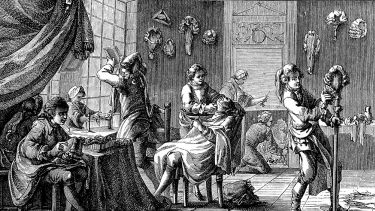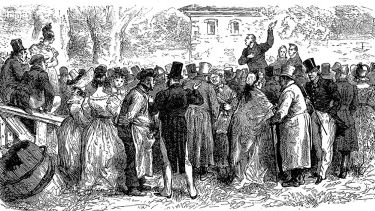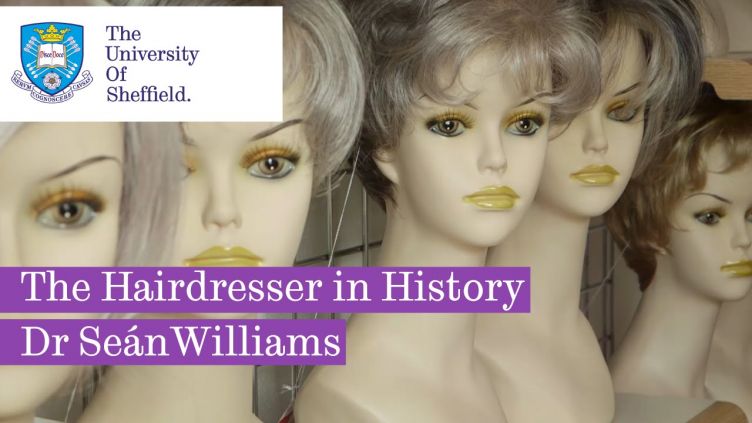European everyday life around 1800
The end of the eighteenth century was a time of upheaval. Dr SeĂ¡n Williams explores the birth of the properly political citizen, the powerful customer, the popular philosopher, and above all: the self-made, self-educated subject in life around 1800.

Upheaval in an age of art
The end of the eighteenth century was a time of upheaval. There was not only the French revolution, but also the industrial revolution and, following the Enlightenment, there had been an intellectual revolution as well.
The advent of ‘modernity’ saw the birth of the properly political citizen, the powerful customer, the popular philosopher, and above all: the self-made, self-educated subject.
There was a new consciousness of the individual and of individual consciousness. All of this was expressed in an age of art: because this time was not only about the Enlightenment, but was the beginning, too, of European Romanticism.
Podcasts and learning resources
These podcasts are made in conjunction with the Institute for Modern Languages Research, the Austrian Cultural Forum, New Books in German, and with the support of the Embassy of Switzerland. They cover a range of Germanic cultural topics, and are accompanied on this site by learning resources (such as comprehension exercises) suitable for those studying German at A Level (or equivalent) through to degree standard.
Literature in Lockdown: Liechtenstein Podcast feat. Benjamin Quaderer
Dr SeĂ¡n Williams discusses Benjamin Quaderer’s novel, the image of Liechtenstein, and its local and global identities.
Student exercises – from A Level to degree
This extra, shorter podcast trains your comprehension skills. It refers to the interview with Benjamin Quaderer, which is in German. It also gives you the opportunity to practise formulating paragraph-length responses, to work on your active as well as your passive language skills. Take a look at the if you find listening to the questions difficult without accompanying text. The is also provided.
Kafka in Quarantine
During life in lockdown, many of us are turning not only to literature, but also to cultural performances being streamed online. Prompted by the Royal Ballet’s adaptation of ‘The Metamorphosis’ (‘Die Verwandlung’), which was staged in 2011 and became available to audiences worldwide during the coronavirus pandemic, we wanted to think about reading and watching Kafka in these confined and uncertain times.
Dr SeĂ¡n Williams talks to choreographer Arthur Pita, academics Drs Lucia Ruprecht and Emily Troscianko, and hears from students at the University of 91Ö±²¥: Ben Whiteside, Jonny Shipton, and Rowan Evenden. The podcast covers troubling themes, questions about catharsis and the arts, and finds creativity in crisis. By the (upbeat) end, we hope you might be dancing to Kafka around your kitchen.
Made for the Ingeborg Bachmann Centre for Austrian Literature and Culture at the Institute of Modern Languages Research, in conjunction with the Austrian Cultural Forum and the University of 91Ö±²¥. Produced by SeĂ¡n Williams, with sound engineering by Iain Hunter.
The hairdresser's story
SeĂ¡n is currently writing a cultural history of modernity since the eighteenth century, told as a biography of the hairdresser.
The word hairdresser was coined in eighteenth-century England; the character was also called the coiffeur and friseur, terms that passed through French, English, German and other vocabularies in the same period.
Dr SĂ©an Williams
Senior Lecturer in German and European Cultural History
SeĂ¡n’s next book, under contract with Reaktion, narrates and illustrates the story of this social figure since the eighteenth century, showing that the hairdresser’s history is shaped in no small part by its history of representation: in literature, opera, and film.
‘Literary’ sources are especially important because many of the more empirical, everyday ones are no longer extant, or do not reveal much. The history of the hairdresser’s representation, meanwhile, performs this character’s development in modern culture since the eighteenth century entertainingly and — most importantly — in a critical way.
SeĂ¡n is available to give talks on this subject, and on many other quirky topics from the long eighteenth century.
Radio, articles and books
Read articles and listen to a selection of SeĂ¡n’s radio programmes, which explore how the big names from literature and philosophy around 1800 were as concerned with major changes in everyday life as an ordinary local vicar, hairdresser, apothecary… or proud poodle-owner.
Pooch epistles – A little history of lapdogs
A history of the lapdog from the 18th century to the present day.
Proms Plus: Beethoven’s 9th Symphony
Presenter SeĂ¡n Williams discusses Beethoven the man. Through a series of readings we learn what inspired the composer’s work.
Why bling booms when austerity rises
Dr SeĂ¡n Williams examines why luxury has fascinated and enraged from the 18th century to today.
Listen: The enduring contradictions of luxury
Visiting fine hotels and expensive boutiques, SeĂ¡n Williams seeks to understand what constitutes luxury and why it’s so problematic.
Liechtenstein, the magic princedom
SeĂ¡n Williams explores Liechtenstein, one of the smallest countries in the world.
Rambling Reflections: On Summers in Switzerland and 91Ö±²¥
In the footsteps of Jean-Jacques Rousseau and Karl Philipp Moritz – from the peace of Lake Biel to the rugged Peaks – SeĂ¡n Williams considers the connection between walking and writing.
Listen: The rise and fall of the hairdresser
SeĂ¡n Williams considers the depiction of hairdressers in prints and prose and the role they have played in society, from ETA Hoffman to Balzac and beyond.
Listen: A sentimental journey
SeĂ¡n Williams rereads Laurence Sterne’s 1768 travel book, talks to novelist Philip Hensher, and to Nick Hunt about about walking Europe’s winds.
Listen: Louisa Egbunike and Sean Williams
Louisa Edbunike and SeĂ¡n Williams discuss Afrofuturism and German Lieder.
Listen: Proms Extra – Sentimentality
SeĂ¡n Williams joins a panel to discuss Friedrich Schiller’s essay On NaĂ¯ve and Sentimental Poetry and what it means to be sentimental in that period.
ETA Hoffmann and the Hairdresser around 1800
Article by SeĂ¡n M Williams. Free to read and share.
Pretexts for Writing – German Romantic Prefaces, Literature, and Philosophy
Buy SeĂ¡n’s latest book on the period around 1800.




